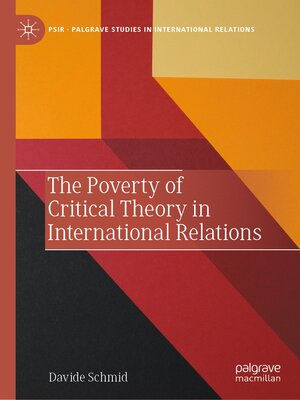The Poverty of Critical Theory in International Relations
ebook ∣ Palgrave Studies in International Relations
By Davide Schmid

Sign up to save your library
With an OverDrive account, you can save your favorite libraries for at-a-glance information about availability. Find out more about OverDrive accounts.
Find this title in Libby, the library reading app by OverDrive.



Search for a digital library with this title
Title found at these libraries:
| Library Name | Distance |
|---|---|
| Loading... |
This book addresses the 'crisis of critique' of Frankfurt School Critical Theory in International Relations and puts forward a proposal for how it can be overcome. It starts from the premise that the present conjuncture, marked by capitalist crisis and a fracturing international order, urgently calls for critical perspectives capable of clarifying the state of global affairs and the emancipatory struggles within it. Critical Theory in International Relations should be well placed to provide answers to this demand, yet it finds itself today in a state of decline. Its prevailing form – that of a universalist cosmopolitan project – reflects a narrow Eurocentric perspective and the concerns of a time now past, while the Frankfurt School tradition as a whole struggles to develop new modes of analysis and new political imaginaries that are appropriate to the current historical situation. The book diagnosesthis situation of intellectual and political crisis and seeks to trace a way out. It does so by providing a comprehensive account of the development of Critical Theory in International Relations and the ways in which it has applied Frankfurt School thought to the study of international politics. It then makes a provocative case as to the exhaustion of the cosmopolitan and Habermasian paradigm of critique that has guided Frankfurt School research on international politics for the past thirty years. Finally, it puts forward a proposal for the revitalisation of Critical Theory in IR through a renewed emphasis on the critique of political economy and sketches a research agenda which can make the tradition relevant again to contemporary political questions.







